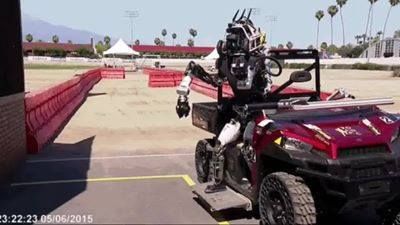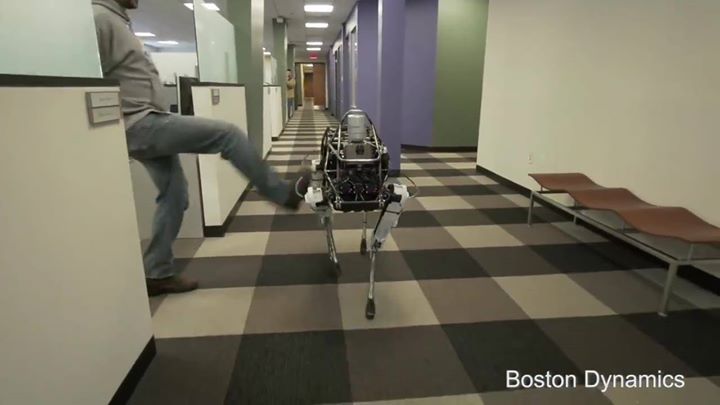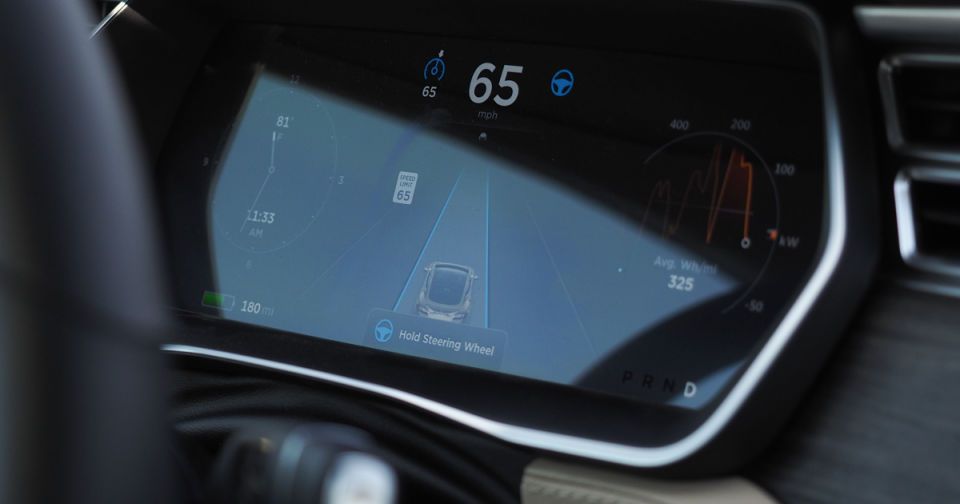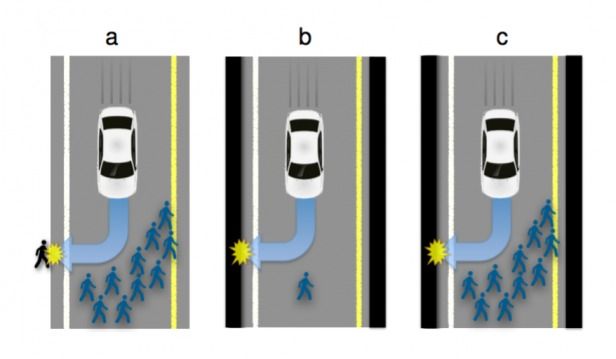This robot can precisely copy your movements, but more impressively, it can solve a Rubik Cube all by itself. http://voc.tv/1cRrjAQ


This robot can precisely copy your movements, but more impressively, it can solve a Rubik Cube all by itself. http://voc.tv/1cRrjAQ

They cannot stop us. They cannot stop the future. At the recent DARPA Robotics Challenge, things didn’t always go as planned…



At the launch of its latest Autopilot features, Tesla CEO Elon Musk noted that it would roll out the new vehicle capabilities to nations outside the United States once it got regulatory approval. Today Musk tweeted that the company has gotten approval from all those countries (except Japan). Now Tesla owners around the world can enjoy the slightly unnerving feeling of letting their Model S drive itself on the highway. Musk also announced that Autopilot 1.01 would be coming soon with improved fleet learning, better lane tracking on poor roads, curved speed adoption and controller smoothness.

You might not be able to control the 7Bot robotic arm with your mind or your eyes, but at least it’ll only cost you around $350 — cheaper than an iPhone, its creators point out — to get one. Even better, you don’t need to know how to code to program it: just physically guide the arm or use a gesture control device like a Kinect or a Leap motion sensor to make it mimic your movements. In the video below the fold and on its Kickstarter page, you can see it doing calligraphy after a team member’s grandfather physically taught it how. The team also managed make it paint cherry blossoms and do basic mathematics, and we’ll bet you can teach it other productive things, like how to terrorize your cat.
If you prefer the more hands-off approach, you can remotely control it using its 3D visualization app on a computer. And, in case you’re more tech-savvy than the average user, you can program it using the C and C++ open source APIs the 7Bot team provides. In addition to the basic model, the team also offers packages with more features, such as a version with two arms and one that comes with a 3D printer, though they’re also understandably more expensive. According to its campaign page, rewards should start shipping out as soon as January 2016, but as always, it’s best not to treat Kickstarter and other crowdfunding websites as a store.
Ask just about anyone on the street to describe artificial intelligence and odds are, they’ll describe something resembling the futuristic science fiction robot they’ve seen in movies and television shows. However, according to Mathematician, Linguist and Artificial Intelligence Researcher Dr. András Kornai, artificial intelligence is a reality right now, and its impact can be seen every day.
“I’d say 35 percent of the total commerce taking place on Wall Street (right now) is driven by algorithms and it’s no longer driven by humans,” Kornai said. “This is not science fiction. (Artificial intelligence) is with us today.”
What we’ve seen so far in the application of algorithm-based artificial intelligence in the financial sector is just the tip of the iceberg, Kornai said. In fact, you don’t even have to own stock to be affected by it.
“I have designed algorithms that will (determine) your creditworthiness, meaning your creditworthiness is now determined by an algorithm,” he said. “We have substituted human-decision making capabilities in favor of better algorithms to pursue this, and we have given up a huge area of human competence, and money is just one aspect of it.”
Kornai points to advances in algorithm-based medical diagnostics, autonomous cars and military technology as some other areas where artificial intelligence is already at work and poised for further growth. While that growth is presented as a good thing, he believes the subtle infiltration of AI has many people missing the larger picture.
“We are seeing an uptick in medical decisions by algorithms and I’m not opposed to this, as it’s important to have the best possible information in the medical world. And in 10 or 15 years autonomous vehicles will be a big deal,” Kornai said. “In military technology, drones are generally human controlled, but there is intense research toward autonomous ground or air vehicles that will work even if someone is trying to cut off their communication. This is not the future, this is here now.”
According to Kornai, since algorithms are based on statistics, the problem with algorithm-based advances in those areas is the level of error that is inherent to the system. That built-in error may not be able to cause bodily harm, he said, but it can still cause havoc to humanity as a whole.
“A certain amount of error is built into the system in every level of AI. Things work on a statistical basis and they have errors but, on the whole, that’s innocent,” he said. “Algorithms are not capable of hurting people directly. But once it comes to money or it comes to your health or your legal standing, (the potential for errors) is becoming increasingly serious.”
In spite of most people’s image of the future of artificial intelligence, that danger is significantly different than the perils depicted on the big screen, Kornai said. To illustrate that point, he highlighted the gap between algorithmic AI and the state of robotics. While technology has already developed a chess algorithm that can beat the best chess players in the world, a ping-pong playing robot that can beat the world’s best table tennis player has yet to materialize.
“The primary worry is everyday, ubiquitous algorithms, the kind of algorithms that are already around us, posing huge damage,” Kornai said. “This isn’t the Terminator coming along and killing humans. That’s more science fictional.”
Looking to the future, Kornai sees AI making the biggest inroads in the business world. Again, he noted that use of those everyday algorithms may not be widely noticed, but their impact will be significant.
“In the business world today, it’s much easier to start a company and those companies will increasingly be driven by AI,” he said. “Eventually, AI will play a bigger role in the boardroom. It may not be visible to the man on the street, but it will be very visible to the Fortune 500.”
That said, however, there are still broader risks ahead as AI advances, and Kornai said he generally agrees with the concerns that have been voiced of late by Hawking, Gates, Musk and others. Those perils might not jibe with Hollywood’s idea of them, but the effects will still be notable.
“These guys see what’s going on and are doing some far-sighted (thinking). Far-sighted is not science fictional,” Kornai said. “Far-sighted is thinking ahead maybe 10, 15 or 25 years ahead. We’re not talking about affecting our grandchildren, but things that will affect us and increasingly affect our children and grandchildren.”

Kamaz’s new driverless trucks, already undergoing extensive testing, is set to go on a tour of European Russia. Beginning next year, testing will begin on the Moscow-St. Petersburg motorway. After that, the company plans to take its creation on a real cross-continental road trip, from Helsinki to Beijing.

Self-driving cars are already cruising the streets. But before they can become widespread, carmakers must solve an impossible ethical dilemma of algorithmic morality.

The primary objective of the mission is to find rare Earth elements that the team believes to be abundant on the moon.
California-based Moon Express is planning to make the first ever private moon landing by 2017. Their plan includes a series of robotic spacecraft intended to explore the moon’s surface and the possibility of commercial development. The company has teamed up with Rocket Lab to help launch their robotic spacecraft into the atmosphere. Rocket Lab uses battery-powered rocket engines that are cheaper than traditional engines.
If the plan succeeds, this is going to be the first ever privately-backed venture to achieve a lunar landing, and will hopefully encourage other enterprises to follow suit. From a financial perspective, the primary objective of this mission is to find rare Earth elements that the team believes are largely abundant on the Moon. If these elements are indeed found we can expect a new-age mini-lunar race to ensue.